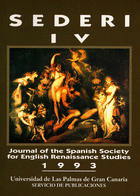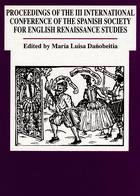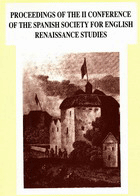| Ahrens, Rüdiger. Rhetorical means and comic effects in William Shakespeare’s Twelfth Night |
1-17 |
|
| Aguilera Linde, Mauricio D., Rosa Morillas Sánchez. Dulce et utile: Sidney’s contradictory poetic theory |
19-29 |
|
| Aguirre, Manuel. Towards a linguistic ecology of the Renaissance |
31-37 |
|
| Bregazzi, Josephine. Weaving an ironic web. Irony as structure in The Duchess of Malfi and The White Devil |
39-48 |
|
| Calvo, Clara. ‘Too wise to woo peaceably’: The meanings of thou in Shakespeare’s wooing-scenes |
49-59 |
|
| Dañobeitia, María Luisa. A very commonplace but painful case: A study of Venus and Adonis andThe Rape of Lucrece |
61-76 |
|
| Elam, Keir. Inelocutio: Shakespeare & the rhetoric of passions |
77-90 |
|
| Fernández Suarez, Juan Ramón. Henry VIII’s learned wives |
91-98 |
|
| García García, Luciano. Religion and rebelliousness in Marlowe’s Doctor Faustus |
99-110 |
|
| Gleeson, Mary. Three scenes of sorcery: An analysis of witchcraft in Macbeth |
111-121 |
|
| González Fernández de Sevilla, José Manuel. Nick Dear’s adaptation of Tirso’s Don Juan |
123-132 |
|
| Guerra Bosch, Teresa. On Cressida’s defence |
133-138 |
|
| López-Peláez Casellas, Jesús. Saint Augustine and the Renaissance concept of honour |
139-148 |
|
| López-Peláez Casellas, María Paz. La música sacra inglesa en el Renacimiento |
149-157 |
|
| López Román, Blanca. Multicritical introduction to Shakespeare television adaptations and the BBC Hamlet (1980, 1990) |
159-169 |
|
| Martínez López, Miguel. The Thomist concept of virtue in Ch. Marlowe’s Doctor Faustus |
171-181 |
|
| Medina Casado, Carmelo. Presencia de Shakespeare en la obra de Antonio Machado |
183-194 |
|
| Monnickendam, Andrew. Anti-Scottish sentiment and the rise of Englishness |
195-208 |
|
| Murillo Murillo, Ana María. Spanish books in Captain Stevens’ library |
209-218 |
|
| Olivares Merino, Eugenio. On Prospero’s abjuration of his «rough magic» |
219-231 |
|
| Oliveira Villacampa, Macario. King James Bible: Language and times |
233-242 |
|
| Pando Canteli, María Jesús. The treatment of the feminine in Donne’s love poetry: Some traces of the Roman elegy |
243-253 |
|
| Pérez Valverde, Cristina. Misogyny and witchcraft in the Jacobean period: The case of Mother Sawyer |
255-266 |
|
| Sáez, Rosa. Religion, law and justice in The Merchant of Venice, Los intereses creados and La ciudad alegre y confiada |
267-275 |
|
| Sánchez Escribano, F. Javier. Learning Spanish in England in the 16th and 17th centuries |
277-291 |
|
| Shaw, Patricia. «I like my wiues deuise well»: Resourceful women in Deloney’s fiction |
294-301 |
|
| Shepherd, Robert K. Edmund Waller Impounded |
303-311 |
|
| Sierra Ayala, Lina. The religious advice of young Bacon to his Queen |
313-322 |
|
| Smale, Mervyn. «All our yesterdays»: Time as protagonist in Macbeth |
323-328 |
|
| Tejera, Dioni. Decisiva influencia de Thomas Gage en el «Western design» de Oliver Cromwell |
329-342 |
|
| Wallhead, Celia. Complaints about court life in Renaissance England and Spain. A comparison between Edmund Spenser’s Prosopopoia or Mother Hubbard’s Tale and an anonymous letter of 1591 from Madrid to El Escorial (Public Record Office State Papers: Spain 94 vol 4, part 1, folios 51-53v |
343-354 |
|
| Valdés Miyares, Rubén. «What Knox really did»: John Knox and the Scottish Renaissances |
358-365 |
|



